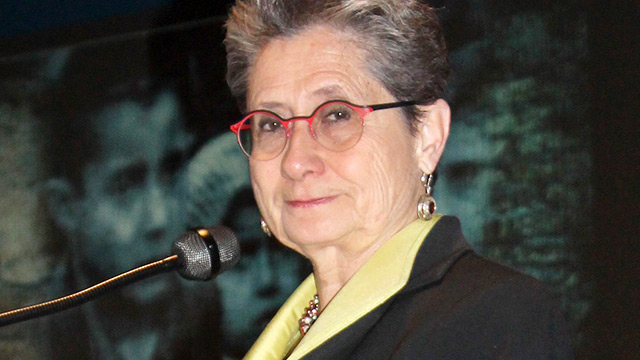“Hidden child” believes in power of love

General
Eva Kuper believes in the power of love. It’s the reason the 77-year-old Holocaust survivor agreed to speak at Holy Family Parish April 30 to mark the annual Christian Commemoration of the Shaoh.
The first Christian Commemoration was held here in 1980, organized by the Christian-Jewish Dialogue, probably the first held in Canada.
Kuper is among the few European Jewish children who escaped the genocidal policy of Hitler's Germany. Only an estimated six to 11 per cent survived, mainly because they were hidden. Kuper was such a "hidden child" and she shared the intimate, stark details of her early life in Poland under Nazi and then Soviet regimes.
For most of her adult life, Kuper did not want to know too many details of her tragic childhood nor did her father talk much about it. It was her daughter, Felisa, who later on urged her to look into her traumatic past.
It was only in 2005 that Kuper steeled herself to travel back to the country of her birth, where her mother, Fela, perished in 1942, having been summarily included in one of the regular round-ups that occurred in the Warsaw Ghetto.
Clutching two-year-old Eva, her mother was herded into a cattle car bound for Treblinka. Her cousin Regina, upon learning that Fela was in the round-up, dashed to the queue, shouting that Eva was, in fact, her child and that Fela had been minding her,'' Kuper told the assembly.
"For some unfathomable reason, my mother was permitted to pass me hand-to-hand until I was literally thrown off that cattle car into Regina's arms,'' Kuper recalled.
"Only as a mature adult did I truly understand the choices made by Regina and by my mother.....to pass a beloved child off forever in order to take the infinitesimal chance that she could be saved from certain death, a choice unnatural to a mother, whose every instinct cries out to hold her child close.''
Soon after, Eva and her father escaped from the Ghetto. He assumed a Catholic identity and entrusted Eva to a kindly Catholic woman, Hanka. However, within months the woman's health deteriorated as she had tuberculosis.
"Desperately looking for a place for me, she came upon a group of nuns, one of whom she knew," Eva learned decades later. "She pleaded with the nun to take 'her little girl,' since these nuns were already looking after a number of blind children." The nun reluctantly agreed, and Eva remained at the convent for three years, until the end of the war when she was reunited with her father.
The family lived as Catholics in Soviet-occupied Poland, emigrating in December 1948. It was only when they were safe at sea that the eight-year-old learned she was not Catholic, but Jewish. After a short stay in Toronto, the family settled in Montreal in 1950.
"I was appalled. I was a Catholic child who prayed, had made her First Communion ...it could not be true," she recalled. "It took me many years to become comfortable with my Jewish identity and to take pride in the history and contributions of my people."
During her 2005 trip to Poland, she met with American genealogist Yale Reisner, based at the Jewish Historical Institute in Warsaw. After learning her story, he consulted a book listing convents instrumental in saving Jewish children and found a passage that said: "a nun, Sister Klara Jaroszynska, a member of the Franciscan Sisters of the Cross, whose mission was to educate and care for blind children, had saved the life of a Jewish little girl."
"I was speechless," Eva exclaimed, "certain that this little girl was ME!"
Eva then learned that Sr. Klara, now 94 years old and blind, was not only very much live but her memory and sense of humour were very much intact.
Arriving at the convent in Laski, Sr. Klara emerged, supported by two younger nuns. She immediately spread her arms wide, and Eva said she "flew into them."
"Because I was so young during the war, I had no memory of her, not her face, her voice...nothing. Yet, when I was in her arms, and we were holding each other and crying, I felt like I had come home... a strong connection. I call it "emotional memory" and it was very moving."
"She told me that she had fallen in love with me...a tiny child with bright dark eyes and an engaging manner. When she met Hanka Rembowska who begged her to take me, I apparently ran to her, put my arms around her legs and looking up at her face said: 'please pick me up'. She said that God had brought me to her, and she had no choice but to risk her life and the lives of all who were with her during the war, by taking me."
It was, the elderly nun said, "the right, the moral thing to do."
Sister Klara died in 2010, but during the last five years of her life, their relationship grew.
"My reunion with her changed my life. It made me aware of the most precious gifts she had given me...not only the gift of life but also, the gift of love. She made it possible for me to be the person I am today ... a person who loves her family, her friends, her community and who finds pleasure and sustenance through contact with others and through 'giving back' to society."
"Sr. Klara filled in a black hole for me, telling me stories about myself as I grew up," Eva explained later during a telephone interview, "it was healing."
This leads Eva to conclude: "I share my story believing that it will make my audiences understand our history with the hope, however slim, that we can create a world in which all that we have in common as human beings, will be more important and binding than the differences which tear us apart."

Comment
0 Comment
Add new comment